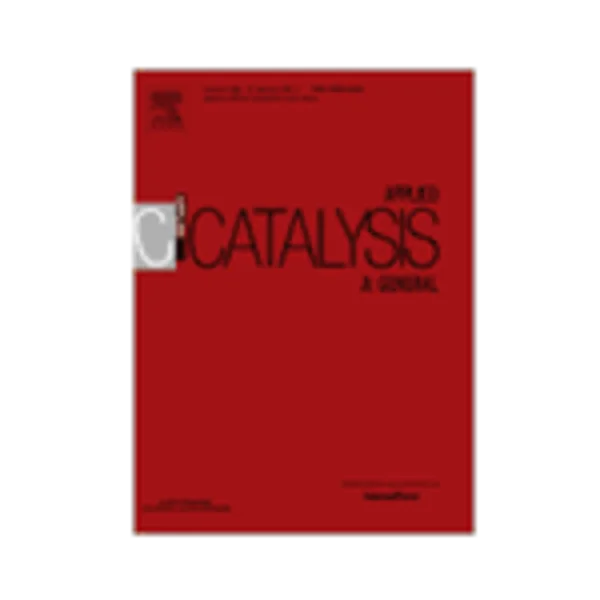-
ph-so3h-modified mesoporous carbon as an efficient catalyst for the esterification of oleic acid
جزئیات بیشتر مقاله- تاریخ ارائه: 1392/07/24
- تاریخ انتشار در تی پی بین: 1392/07/24
- تعداد بازدید: 1316
- تعداد پرسش و پاسخ ها: 0
- شماره تماس دبیرخانه رویداد: -
mesoporous carbon materials with thin pore walls (∼1.7 nm) were synthesized using low-cost γ-al2o3 as a hard template and in situ polymerized resorcinol–furfural resin as the carbon precursor. compared with sugar, resin, a widely used carbon precursor, has higher carbon yield and simplifies the synthetic process. ph-so3h modified mesoporous carbon was synthesized by covalent grafting of ph-so3h groups on mesoporous carbon via the diazonium salt. the resulting materials were characterized by means of nitrogen adsorption analysis, tem, 13c nmr, xrd, ftir and sulfur elemental analysis. the modified carbons were shown to possess high surface area (∼1000 m2/g), a bimodal pore size distribution and high strong acid density (1.86 mmol h+/g). these sulfonated carbons were used as solid acid catalysts in the esterification of oleic acid and methanol, a key reaction in biodiesel production. compared with the traditional solid acid amberlyst-15, the optimized carbon catalyst exhibited much higher activity with a rate constant (1.34 h−1) three times to that of amberlyt-15 and a turnover frequency (tof) of 128 h−1 eight times that of amberlyst-15. the efficient catalytic ability was attributed to the high surface area and a proper mesopore texture. this carbon catalyst could then be easily separated from the product by filtration. the catalyst was reused six times, and no distinct activity drop was observed after the initial deactivation.
مقالات جدیدترین رویدادها
-
استفاده از تحلیل اهمیت-عملکرد در ارائه الگوی مدیریت خلاقیت سازمانی و ارائه راهکار جهت بهبود
-
بررسی تاثیر ارزش وجوه نقد مازاد بر ساختار سرمایه شرکت های پذیرفته شده در بورس اوراق بهادار تهران
-
بررسی تأثیر سطح افشای ریسک بر قرارداد بدهی شرکت های پذیرفته شده در بورس اوراق بهادار تهران
-
بررسی تأثیر رتبه بندی اعتباری مبتنی بر مدل امتیاز بازار نوظهور بر نقد شوندگی سهام با تأکید بر خصوصی سازی شرکت ها
-
تأثیر آمیخته بازاریابی پوشاک ایرانی بر تصویر ذهنی مشتری پوشاک ایرانی (هاکوپیان)
-
شبیه سازی تبخیر با استفاده از مدل های فازی عصبی و مقایسه آن با مدل های سری زمانی (مطالعه موردی: دشت جم)
-
کاربرد جدول عمر در برآورد طول عمر و عوامل موثر بر آن در سرطان مری
-
تأثیر تحریک الکتریکی با فرکانس پایین بر اکتساب کیندلینگ و انتقال سیناپسی در شکنج دندانه دار موش صحرایی
-
گزارش یک مورد سندرم نورولپتیک بدخیم ناشی از مصرف ریسپریدون در افراد با ریسک پذیری پایین
-
ranking of the competitive service quality factors using fahp and fuzzy topsis techniques
مقالات جدیدترین ژورنال ها
-
مدیریت و بررسی افسردگی دانش آموزان دختر مقطع متوسطه دوم در دروان کرونا در شهرستان دزفول
-
مدیریت و بررسی خرد سیاسی در اندیشه ی فردوسی در ادب ایران
-
واکاوی و مدیریت توصیفی قلمدان(جاکلیدی)ضریح در موزه آستان قدس رضوی
-
بررسی تاثیر خلاقیت، دانش و انگیزه کارکنان بر پیشنهادات نوآورانه کارکنان ( مورد مطالعه: هتل های 3 و 4 ستاره استان کرمان)
-
بررسی تاثیر کیفیت سیستم های اطلاعاتی بر تصمیم گیری موفق در شرکتهای تولیدی استان اصفهان (مورد مطالعه: مدیران شرکتهای تولیدی استان اصفهان)
-
تأثیر عوامل عاطفی بر واکنش های رفتاری مشتری به تبلیغات شخصی شده آنلاین با نقش میانجی مولفه های نظریه انتخاب عقلایی
-
بررسی نقش تحقیق و توسعه در ویژگی های کارآفرینی کارکنان شرکت ایران خودرو شهر تهران
-
ملاک های سلامت معنوی در پنج ساحت انسان مبتنی بر آموزه های قرآن
-
ارتباط تعامل آمیز سبک زندگی اسلامی با ویژگی های شخصیتی
-
دانشگاه، اخلاق مداری و کارآفرینی




سوال خود را در مورد این مقاله مطرح نمایید :